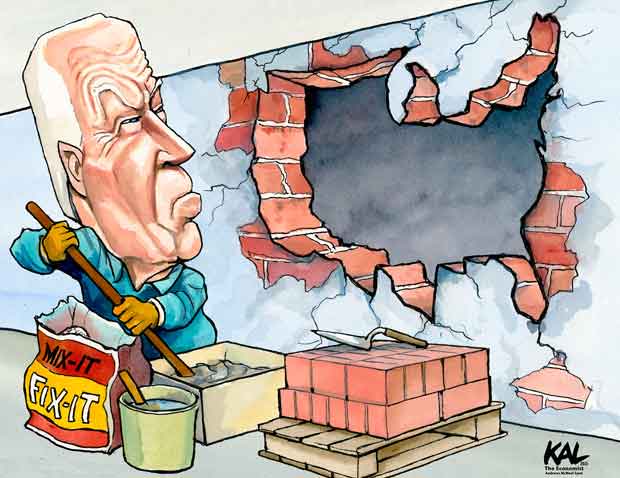
When it comes to the crises spawned by the collapse of Baltimore's Francis Scott Key Bridge, Transportation Secretary Pete Buttigieg says he is "giving it everything I've got." That's good to hear, but it may take more than that.
Rebuilding the bridge is expected to be an extremely slow process, largely because building almost anything in the US is an extremely slow process. And that's where the country could use not a transportation policy expert (which Buttigieg is not) but a smart, hard-working politician (which Buttigieg is) who sees that the public is deeply skeptical — with some good reason — that any of President Joe Biden's grand dreams for American renewal can become reality in a country covered in red tape.
Former Transportation Secretary Ray LaHood, for example, told Politico that "planning is going to take a couple of years, and the rebuild is going to take several years." But he expected Buttigieg to "lay the groundwork" for the project.
A good way to start laying the groundwork would be to insist that a years-long planning process is not acceptable. This is, after all, a bridge that's been there since 1977. Engineers know its starting point. They know its endpoint. They know how tall it has to be for ships to pass under it. They know which roads it connects to.
In other words, a lot of planning has already been done. There's no need to start from scratch.
Of course, the various stakeholders will have different ideas about how to build back better, to coin a phrase, and their proposals will have some upsides and downsides — including their impact on the environment, the timeline and the cost. The key to accelerating the planning process is to start at where this has to end: a new bridge. Decisions will be made that not everyone will be happy with, and the people in charge will have to live with that.
One of the great fallacies of infrastructure planning in contemporary America is the idea that more time and more input will generate consensus. We live in a world that inevitably requires tradeoffs. The contribution that only a politician can deliver to the planning process is to insist that it be done quickly. That's what Buttigieg should demand from the relevant decision-makers from the city, the state, the port and the companies that store and ship their cargo in the harbor.
Then come the regulatory matters.
Pennsylvania Governor Josh Shapiro's successful rebuild of Interstate 95 in Philadelphia featured dramatic regulatory action to speed construction. His emergency proclamation contained one provision authorizing state agencies to use "emergency procurement procedures" rather than the normal ones, and another provision which states: "I hereby suspend the provisions of any other regulatory statute prescribing the procedures for conduct of Commonwealth business, or the orders, rules or regulations of any Commonwealth agency, if strict compliance with the provisions of any stature, order, rule or regulation would in any way prevent, hinder, or delay necessary action in coping with this emergency event."
It's not going to be inscribed on a statue anytime soon. But it's a big change, and it's what "prioritizing" a project looks like.
If Maryland wants to rebuild the Key bridge exactly the way it was before its collapse, it qualifies for an exemption from the National Environmental Policy Act review process. But if the bridge is rebuilt with fenders or dolphins to improve safety, no such exemption will apply. Does that make sense? Building bridges also tends to involve the use of boats, which can trigger various requirements under the Jones Act, which requires using American ships in most circumstances. Strict Buy America procurement rules for construction materials, meanwhile, inflate costs and impose delays.
Infrastructure veterans forecasting a years-long construction process are offering realistic estimates based on the normal political conditions facing projects of this scale. Political leadership would mean trying to convince both the state of Maryland and the White House that those conditions are not acceptable.
There is, of course, a strong case for broader reform. A transmission-line project in Wisconsin, for example, on which more than 100 renewable energy projects depend, has been stuck in environmental litigation since 2020 even after a four-year, 1,241-page Environmental Impact Statement. Most of the Biden administration's goals for both clean energy and transportation infrastructure simply can't be met under current conditions. There has been on-again, off-again momentum in Congress for systematic reform, but right now things seem to be stalled.
Maybe the closure of a major highway within driving distance will help concentrate people's minds in Washington. Neither Biden nor Buttigieg can let the rebuilding of the bridge itself be business as usual. And if they succeed in building back faster, maybe it can be a template — not just for how to respond to a transportation crisis, but for how to execute on public projects and help restore public confidence in government.
(COMMENT, BELOW)
Previously:
• 03/27/24: Raising the retirement age won't help anyone
• 03/13/24: Now Biden needs to show his moderate side
• 02/27/24: Will Dems ever embrace charter schools again?
• 10/19/23: Federal budget deficit: From freakout to eff you
• 10/05/23: Ramaswamy likes one of Jimma Carter's worst ideas
• 09/13/23: What happens when renewable energy isn't so cheap?
• 08/09/23: Is Bidenomics working? Ask your waiter
• 08/03/23: America's colleges are also facing a housing crisis
• 07/18/23: Bidenomics' became a doctrine by accident
• 06/20/23: America can fix its highways much faster, if it wants
• 06/07/23: The debt-limit crisis is over. Now on to the debt crisis
• 05/31/23: America needs more housing, but NOT more public housing
• 05/09/23: Football stadiums belong in the suburbs
• 05/02/23: Only Mitch McConnell can save the US from default
• 02/15/23: Biden's building boom will be needlessly expensive
• 01/25/23: Manchin's plan to avert a debt crisis just might work
• 01/10/23: George Santos doesn't deserve to be kicked out of Congress
• 10/03/22 Ron DeSantis and the rise of free-lunch conservatism
• 09/07/22 A debate over the deficit is just what America needs
• 09/03/22 College tuition is too high, but it isn't actually rising
• 08/02/22 Dems need more Manchins
• 06/30/22 Biden 2024? America needs to know now
• 05/30/22 The flaw in the progressive stance on guns
• 05/18/22 Biden can do much more to fight inflation
• 04/05/22 We'll miss globalization when it's gone
• 12/27/21 How 2021 could have been different for Biden
• 11/09/21 Where have you gone, Joe Biden of the primaries?
• 10/05/21What Dems need: More short-term thinking
• 06/02/21
Shh, Congress IS working
Matthew Yglesias writes the Slow Boring blog and newsletter. A co-founder of Vox and a former columnist for Slate, he is also host of "The Weeds" podcast and is the author, most recently, of "One Billion Americans."


 Contact The Editor
Contact The Editor
 Articles By This Author
Articles By This Author